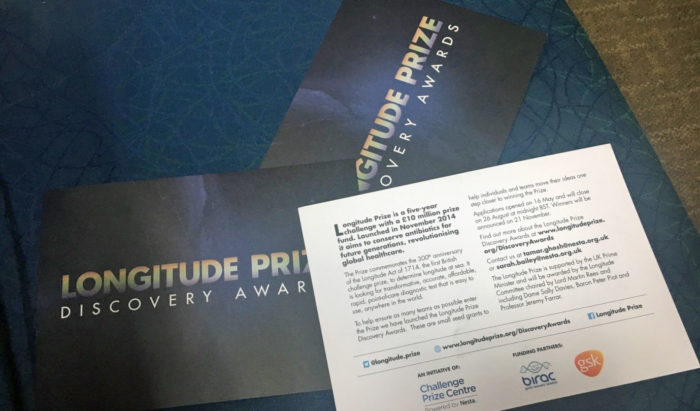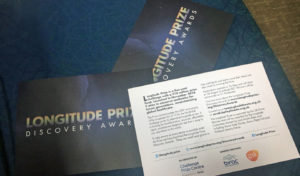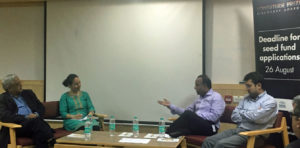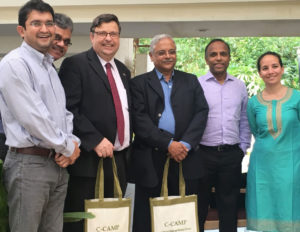1st August 2016 Bangalore, India
AMR: New seed funding to help teams enter the Longitude Prize

On 25 July I attended a workshop and ideathon on the Longitude Prize and Discovery Awards at Centre for Cellular and Molecular Platforms(C-CAMP), Bangalore . The Discovery Awards are a new seed fund to help teams progress ideas for a transformative diagnostic test that will help combat Anti-Microbial Resistance (AMR) by significantly reducing inappropriate use of antimicrobial drugs. Deadline for applications for the seed funding is 26 August 2016.

The workshop was held at C-CAMP, which is an initiative of the Indian government, under the Department of Biotechnology, to provide a major platform for technology, industry interaction, innovation and an incubator hub to enable cutting edge R&D in life sciences. So C-CAMP was an excellent choice to hold a panel discussion on AMR and to promote the new Discovery Awards. The British High Commission held a series of similar events last year with partners from UK and India to promote the Longitude Prize. So if you’ve not heard of it, the Longitude Prize is a five-year challenge with a £10 million award launched in 2014. A key driver behind it is to conserve antibiotics for future generations, thus revolutionising global healthcare. In the past two years my colleagues across the British High Commission network have contributed to the promotion and awareness generation about the Longitude Prize all over the country.

So what are we looking for in a potential prize winner? Judges are seeking an accurate, easy to use, rapid, affordable, diagnostic test kit that will help healthcare professionals worldwide to use antimicrobial agents appropriately and as needed. This could be a crucial link in the fight against Antimicrobial Resistance, which is now, a multifaceted and complex challenge, being faced by the whole world. The Longitude Prize team, and Nesta, the British charity running the prize have been promoting the prize in India, engaging with academia, companies, and individuals, with the strong belief that India has one of the best pool of innovators and researchers in the world.
At the event this week, The British Deputy High Commissioner, Dominic McAllister, spoke of the importance of the Longitude Prize within the work being done by UK on tackling AMR, including the Lord O’Neill led AMR Review, establishment of the Fleming Fund, and working with country partners such as India.
This was followed by a lively panel discussion on AMR, the importance of diagnostics (right antibiotics@right time), and how they improve the eventual outcome of treatment. The panel consisted of Dr Taslimarif Saiyed, COO, C-CAMP, Ms Tamar Ghosh, Lead Longitude Prize, Dr Anand Anandkumar, CEO Bugworks, and Dr B.V Ravikumar, MD, Xcyton. The importance of looking at the three pillars of resistance (diagnosis, treatment and policy) together and not in isolation was again stressed. Next was an interesting round of Q&A with some challenging questions thrown at the panellists and presentations by innovators on what they were working on in the diagnostics field.

The audience was then introduced to Discovery Awards which have been launched by Nesta, BIRAC & GSK together to ensure maximum teams enter the prize. These awards comprise of small seed grants to help individuals and teams further develop their ideas for the Longitude Prize. The awards can be used to further develop an idea, fund the cost of an individual’s time to undertake lab work, cost of reagents, materials and even carry out further tests to generate and analyse data. Several teams who were not registered with the Longitude Prize have now expressed a strong interest in the seed fund as a step to entering the Longitude Prize. This was the reason behind the launch of the Discovery Awards to encourage competitors who lack funding to enter the Longitude competition. The last date for submissions to bid for the Discovery Awards is 26 August 2016.
I hope those interested can use the Discovery Awards to register for the Prize and eventually win it!
